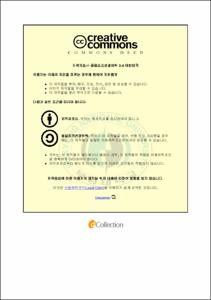챈트와 노래를 활용한 수업이 어휘력 및 정의적 영역에 미치는 영향 : 6학년을 중심으로
- Abstract
- This study investigates how chant and song activities affect 6th graders’ vocabulary competence and affective domain. I implemented a survey to two classes at an elementary school in B province to confirm the effectiveness of the Vocabulary Improvement Model. The survey took 8 weeks and the results are as follows.
Firstly, according to the follow-up tests of vocabulary competence between the experiment group and the comparative group, they both showed a meaningful difference.
Secondly, based on the test results of preliminary and follow-up vocabulary tests, experiment group and comparative group showed meaningful differences in terms of students’ vocabulary competence. Students in the experiment group, however, showed greater positive change in vocabulary competence than those in the comparative group.
Thus, it can be seen that various chant and song activities in Vocabulary Improvement Model do help to raise 6th grader’s vocabulary competence compared to traditional models.
Thirdly, according to the follow-up test results of the affective domain, experiment group and comparative group showed meaningful differences, too.
Fourthly, based on the results of preliminary and follow-up affective domain tests, the experiment group and comparative group showed meaningful changes. The result of the experiment group, however, showed a greater positive difference than comparative group. Thus, we can conclude that various chants and song activities can have a positive effect on 6th grader’s affective domain.
Based on my survey, I recommend three suggestions.
First of all, we need to study more about using smart devices teaching songs and chants. In schools nowadays, there are increasing interests in using smart devices in education. When we adopt smart devices such as the Galaxy Note, and the I-pad, we can use various applications such as chants and songs for kids. In return we can expect greater students' motivation and effectiveness in teaching. Also, with those smart devices, we can promote students -centered learning and additional exposure to English beyond the classroom.
Secondly, current textbooks tend to include only one chant or song per unit. This intends to lower students learning load and to create balance with other teaching factors within the limited class time and predetermined syllabus design. In my opinion, one song or chant is not enough to provide motivation to 6th grade learners. Therefore, I selected additional songs and chants and used them as additional learning material in the classroom. The additional materials are "Anything you can do" from Annie Get Your Gun and "What do you want to do" from EBSe.co.kr.
Thirdly, we need to develop objective tools for vocabulary test to enhance students’ vocabulary competence. Through this, we can compare and measure students' vocabulary competence. Although we have an Essential Vocabulary Test for elementary school students, it only takes place two times a year. Also, as a standardized test, it is not an appropriate tool for individual schools. Furthermore, many teachers say that the Essential Vocabulary Test does not contribute to the improvement of classroom instruction. Therefore, I think we need to develop a new vocabulary assessment tool which guarantees the objectivity of assessment and provides an opportunity for teachers’ adaptation.
- Issued Date
- 2014
- Awarded Date
- 2014. 8
- Type
- Dissertation
- Publisher
- 부경대학교
- Affiliation
- 교육대학원
- Department
- 교육대학원 초등영어교육전공
- Advisor
- 박종원
- Table Of Contents
- Abstract ………………………………………………… v
Ⅰ. 서론 ………………………………………………… 1
1. 연구의 필요성 및 목적 …………………………… 1
2. 연구 과제 …………………………………………… 3
3. 연구의 제한점 ……………………………………… 3
Ⅱ. 이론적 배경 ………………………………………… 5
1. 어휘 교육의 이론적 논의 ………………………… 5
2. 초등 영어 수업에서 노래와 챈트 ……………… 9
3. 선행 연구 ………………………………………… 15
Ⅲ. 연구 방법 ……………………………………… 20
1. 연구 대상 ………………………………………… 20
2. 연구 도구 ………………………………………… 21
3. 연구 설계 ………………………………………… 26
4. 연구의 실행 …………………………………… 27
Ⅳ. 결과 분석……………………………………… 38
1. 연구 문제 1의 결과 ………………………… 38
2. 연구 문제 2의 결과 ………………………… 42
Ⅴ. 결론 및 제언 ………………………………… 47
1. 결론………………………………………… 47
2. 제언………………………………………… 48
참고문헌………………………………………… 50
부록……………………………………………… 53
사전 어휘력 검사지…………… 53
사후 어휘력 검사지Ⅰ…………… 57
사후 어휘력 검사지Ⅱ…………… 59
정의적 영역 설문지……………… 61
- Degree
- Master
- Files in This Item:
-
-
Download
 챈트와 노래를 활용한 수업이 어휘력 및 정의적 영역에 미치는 영향 : 6학년을 중심으로.pdf
기타 데이터 / 1.43 MB / Adobe PDF
챈트와 노래를 활용한 수업이 어휘력 및 정의적 영역에 미치는 영향 : 6학년을 중심으로.pdf
기타 데이터 / 1.43 MB / Adobe PDF
-
Items in Repository are protected by copyright, with all rights reserved, unless otherwise indicated.